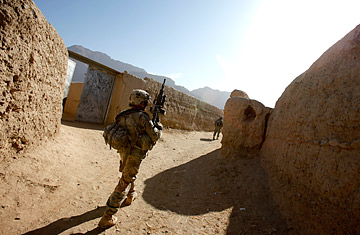
U.S. Soldiers from First Battalion, 502nd Infantry Regiment, 101st Airborne Division patrol West Now Ruzi village, district of Panjwai, Afghanistan, Monday, Nov. 22, 2010.
On Saturday Nov. 27, the United States and its allies will reach a grim milestone: they will have been in Afghanistan a day longer than the Soviet Union had been when it completed its 1989 withdrawal. What's more, the U.S. announced during last weekend's NATO summit that it intends to spend at least four more years, and possibly longer, in the Hindu Kush. Even then, many Afghans — perhaps even the president installed by the U.S. invasion — appear to doubt that the Americans will succeed where their erstwhile Cold War nemesis failed.
Pentagon spokesman Geoff Morrell last week made clear that the 2014 date for an end to combat operations agreed by NATO was an "aspirational" deadline. And an Afghanistan progress report by the Pentagon to the U.S. Congress released Tuesday made clear that despite the Obama Administration's "surge" of some 30,000 extra American soldiers into the war zone, progress has been modest and the insurgency continues to expand. But the key rationale for extending the withdrawal deadline may lie in the report's observation that "the Taliban's strength lies in the Afghan population's perception that coalition forces will soon leave, giving credence to the belief that a Taliban victory is inevitable." The same reasoning may also have prompted the Pentagon last week to dispatch tanks to the Afghan theater for the first time after nine years of war. Of course, the Soviets sent hundreds of tanks into Afghanistan, but that didn't alter the war's dynamic.
The biggest problem facing the NATO mission is not firepower, and it may not even be the locals' expectation that the Western forces will soon leave. More immediately, the U.S. and its allies are confronted with the grim reality that the civilian population in the conflict zone doesn't support the war effort.
President Hamid Karzai may have publicly signed on to the new NATO target dates, but he has made no secret of his skepticism of the war strategy. His recent condemnation of night-time raids by NATO forces pursuing Taliban commanders prompted U.S. commander Gen. David Petraeus to warn that Karzai's comments were making his own position untenable. President Obama, for his part, bluntly rebuked the Afghan leader: "If we are ponying up billions of dollars, if the expectation is that our troops are going to be there to help secure the countryside and ensure that President Karzai can continue to build and develop his country," Obama warned, "then he's got to also pay attention to our concerns as well."
But Karzai's comments appear to be simply following Afghan public opinion. Surveys routinely find that a majority of people in southern Afghanistan, many of whom resent the Taliban, also have a negative view of Western soldiers on their turf, and oppose their operations against the insurgents. A violent distaste for the presence of foreign armies is a leitmotif of Afghan history, of course — as one British general put it in the late 19th century, "the less the Afghans see of us, the more they shall like us." And then there's the fact that the escalation of NATO operations in the Taliban's southern Afghanistan heartland has a traumatic effect on the local population, thousands of whom are displaced by the fighting.
Those refugees tend to blame the Western military presence for the security crisis that forced them to abandon their lands and take shelter as refugees in the cities. One man who lost his father and brother in a botched Taliban operation nonetheless faults the foreign forces, telling the Washington Post that "the more infidels who come to our country, the more Afghans die, and the less safe we become."
Local opinion in southern Afghanistan strongly favors an immediate negotiated peace with the Taliban, clearly unconvinced that any good can come of further fighting regardless of their views of the insurgency. So they don't simply doubt that NATO is going to stay; they doubt that it will prevail. And Karzai appears to share their skepticism.
The Afghan president recently told Pakistani journalist Ahmed Rashid that NATO's military surge in the south has been "unhelpful," turning Afghan cities into garrisons and alienating the local population. He envisaged the war being ended through talks with Iran and Pakistan, saying the U.S. failure to rein in Pakistan's support for the Taliban had left him no choice but to seek closer relations of his own with Islamabad in order to find peace with the Taliban. Of course, Karzai continues to work closely with Washington, despite his doubts, and even as he seeks to cast himself as an Afghan nationalist trying to end the war by stepping between NATO and the Taliban — a strategy known in U.S. presidential parlance as "triangulation."
Karzai, like his Western patrons and even the Taliban, knows that the conflict will ultimately end in a political settlement with the insurgents. U.S. commanders have long insisted that this cannot be achieved from a position of weakness, and digging in for a longer war may be part of a strategy to compel the Taliban to compromise on peace terms. But a movement first scattered by U.S.-led forces in 2001 that began its comeback within three years — and which has a demonstrable ability to withstand major counterinsurgency operations by following the playbook of guerrilla warfare and never seeking to hold ground against a better armed force — is always going to believe it has time on its side.
